
A new investigation reveals the months of physical and mental abuse Venezuelan men deported by the Trump administration endured inside a Salvadoran prison. The men describe beatings, medical neglect and unhygienic conditions in CECOT, where a prison director reportedly told them, “Welcome to Hell, where you enter alive and leave dead.” Of the 238 Venezuelan men who were held in El Salvador, at least 197 had not been convicted of any crime. “The administration itself knew, even when they were portraying them as the violent criminals that deserved to be sent to a prison in a country that was not their own, potentially indefinitely — they actually knew that the vast majority did not have convictions in the U.S.,” says Perla Trevizo, a reporter with the ProPublica-Texas Tribune investigative unit that worked on the investigation with a team of Venezuelan journalists.
Transcript
AMY GOODMAN: This is Democracy Now!, democracynow.org. I’m Amy Goodman.
“Now That They’re Free.” That’s the headline of a new joint investigation that reveals how the hundreds of Venezuela men deported by the Trump administration to El Salvador, then sent to Venezuela, say they endured months of physical and mental abuse inside the Salvadoran mega-prison CECOT. Though happy to be home in Venezuela, they say the fact that they were released is proof of how senseless their detentions were.
The report is the work of reporters from ProPublica, The Texas Tribune and a team of Venezuelan journalists from Rebel Alliance Investigates and Fake News Hunters. In a minute, we’ll be joined by one of the reporters, but first we turn to their video of three Venezuelan men who were held in El Salvador, now home in Venezuela.
ANDRY OMAR BLANCO BONILLA: [translated] My name is Andry Omar Blanco Bonilla.
WILMER JOSÉ VEGA SANDIA: [translated] My name is Wilmer José Vega Sandia.
JUAN JOSÉ RAMOS RAMOS: [translated] My name is Juan José Ramos Ramos.
ON-SCREEN TEXT: In Their Own Words: The Nightmare at CECOT.
JUAN JOSÉ RAMOS RAMOS: [translated] When we landed in El Salvador, I was by a window, and I saw thousands, thousands of officers around the planes.
WILMER JOSÉ VEGA SANDIA: [translated] Fear, fear, fear, fear, fear, fear, terror.
JUAN JOSÉ RAMOS RAMOS: [translated] An officer from El Salvador got on board, and he said, “Either you get off the easy way or the hard way. How will you get off?” “We’re not getting off.” “Oh, the hard way then.” And they started hitting us with batons.
WILMER JOSÉ VEGA SANDIA: [translated] The prison director told us, “Welcome to Hell, where you enter alive and leave dead.”
ANDRY OMAR BLANCO BONILLA: [translated] They forced us to kneel against our will, beating us. There were many people screaming, asking for help, for mercy. The shackles were so tight that they injured our ankles. Many were even bleeding because we were cutting ourselves with the shackles. They would say to us crudely, “Walk, you piece of [bleep].” I remember telling an officer, “I can’t walk. If you loosen the shackles, I can cooperate. But I can’t walk.” I have a medical condition. I’m hypertensive. I was beaten to the point of fainting. They dragged me until we got to the cell block. Then they threw me down. My head hit the floor. I woke up and asked God, “Why am I here?”
JUAN JOSÉ RAMOS RAMOS: [translated] I felt like my world had collapsed. They started putting 10 to 15 people in each cell.
ANDRY OMAR BLANCO BONILLA: [translated] I believe the CECOT prison is not a prison meant to hold inmates. There, I feel like we were treated like animals.
WILMER JOSÉ VEGA SANDIA: [translated] The food tasted like soap. It was shocking. The bathrooms were disgusting. They used the water we had to use the shower.
ANDRY OMAR BLANCO BONILLA: [translated] Sewage, black water pipes ran through the cells. Some people developed respiratory illnesses because of that. The walls were full of mold.
WILMER JOSÉ VEGA SANDIA: [translated] Sleeping on metal, because the beds were iron. I said, “How long are we going to survive this? How long are we going to endure it?” Fifteen minutes for 10 people to shower.
ANDRY OMAR BLANCO BONILLA: [translated] Some didn’t get to shower because time ran out. The price of good hygiene was a beating.
JUAN JOSÉ RAMOS RAMOS: [translated] I tried to bathe secretly, and they saw me. They dragged me to the well, the island, and started beating me, and one officer kept hitting me on the ears as if to disorient me, and the on the temple, right here. They beat me for nearly two hours. Every guard on duty would take turns hitting you. Even the prison director hit us many times. I couldn’t see well out of one eye because of the beatings to the head.
WILMER JOSÉ VEGA SANDIA: [translated] They took us to solitary confinement. They called it the hole. I got hit in my private parts, you could say, from a kick I received. I am still suffering from it. On April 5th, there was a major beating where they beat one of our fellow inmates who was a kid. They pepper-sprayed into his mouth, and he started convulsing on the floor. He was foaming at the mouth. They told us he had died, but, thank God, he is alive. He came back to us. When the Red Cross came for the first time, we spoke out. But speaking out cost us a brutal beating.
ANDRY OMAR BLANCO BONILLA: [translated] They used weapons, firing rubber and plastic pellets, and many were injured, injuries to the head, forehead, legs, back, chest.
JUAN JOSÉ RAMOS RAMOS: [translated] Many of us tried to take our own lives in there. We said, “I’d rather die or kill myself than keep living through this experience,” waking every day at 4 a.m. to insults and beatings, listening to the clanging of metal bars, hearing your brothers get beaten, crying for help. They’d plead, “Please stop hitting me. I’d rather you kill me.”
ANDRY OMAR BLANCO BONILLA: [translated] I don’t deny that I used to support President Nayib Bukele’s policies to fight crime. I never imagined that I would one day experience this injustice myself. It has been a dirty policy. The United States sent us to El Salvador so that El Salvador could do the dirty work that the U.S. couldn’t. And justice will only come through the truths and testimonies of each of us.
AMY GOODMAN: Part of a video report that accompanies a new investigation headlined “Now That They’re Free.”
For more, we’re joined by one of the lead reporters, Perla Trevizo. She’s with the ProPublica-Texas Tribune investigative unit, joining us from Philadelphia.
Perla, welcome back to Democracy Now! As we just listened to these three men, their horrifying stories, you write about another man, Leonardo José Colmenares Solórzano, a 31-year-old Venezuelan, who told you that now that he’s free, he wants the world to know he was tortured over four months in a Salvadoran prison. He said guards stomped on his hands, poured filthy water into his ears, and threatened to beat him if he didn’t kneel alongside other inmates and lick their backs. Tell us more about this investigation, how you reached these men in Venezuela, and what they’re saying today, and what this says about what the U.S. did, arresting well over 200 Venezuelans, sending them to Salvador to be put in CECOT, and then making a deal with a so-called prisoner swap, and then just releasing them to Venezuela.
PERLA TREVIZO: Yes. Well, first of all, thank you for having me.
These men were sent to El Salvador on March 15. From that day on, we started gathering as much information as we could about them. We started reaching out to families. Then, when CBS News published a list of the names, we started compiling this database. We wanted to know who these men are. The administration was portraying them as the worst of the worst, violent criminals who deserved to be there. And we wanted to, you know, learn a little bit more about them.
In total, we reached out to more than a hundred family members and lawyers for these men. We combed records in the U.S., in Venezuela, Chile, Peru, Colombia. And the men that you just saw right now, you know, we had been in touch with their families for months at this point, and the conversations were very much about the void that they had left behind. You know, they were wondering whether they were alive. One mom was telling me — you know, when I asked her, “What do you think about?” it’s like, you know, “Is he eating? Is he sleeping? Is he alive?” because the administration at that point had not confirmed — and even up to this point, they have not provided an official list of who was sent to El Salvador.
So, by the time that they were released, that they were free, we had been building relationships with these moms. And, you know, there’s dozens, hundreds of stories that we could have told, and these are just three of the examples that we thought, you know, provided — exemplify what the broader group had lived through.
AMY GOODMAN: Of the more than 230 men who were sent to Venezuela, you discovered at least 197 had not been convicted of crimes in the U.S. and that the Trump administration was aware of this as President Trump was saying, “We’re going after the worst of the worst, the rapists and the murderers.” Perla?
PERLA TREVIZO: Yes. So, we obtained — you know, in addition to the background information that I described, we also obtained internal government records that showed how the government itself was labeling them, whether they had criminal convictions in the U.S., whether they had pending charges or they were deemed immigration violators, meaning they had only violated immigration laws. And so, not only does this match what others had reported, but it shows that the administration itself knew, even when they were portraying them as the violent criminals that deserved to be sent to a prison in a country that was not their own, potentially indefinitely — they actually knew that the vast majority did not have convictions in the U.S. And we found that, you know, from those, six, half a dozen of them, had convictions for what would be deemed violent crimes.
AMY GOODMAN: You also write that the State Department said it’s not responsible for the conditions of the place where the U.S. sent the men to. You had Bukele saying the U.S. is in charge. And, of course, you had President Trump saying that Bukele was in charge. Perla, your final comment?
PERLA TREVIZO: You know, I think this is part of the issue that experts, advocates, lawyers point out, too. When you push border enforcement and detention out, who is responsible at the end for what happens to the — in this case, these men who were detained? I think everyone by the U.S. pushing into El Salvador says, “Whatever happens in El Salvador is not our issue.” El Salvador is saying, “Well, you know, it’s still under the jurisdiction of the U.S.” So, at the end, who is accountable for any human rights violations that the men allege occurred while they were in detention for months?
AMY GOODMAN: Perla Trevizo, we’re going to link to the ProPublica-Texas Tribune report at democracynow.org. We’re going to also do an interview with you in Spanish, post it online. I’m Amy Goodman, Thanks for joining us.


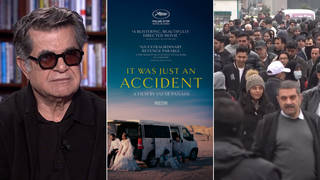
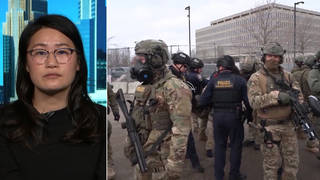
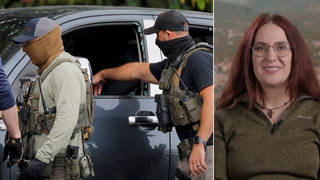

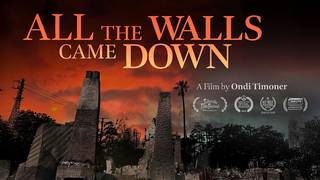
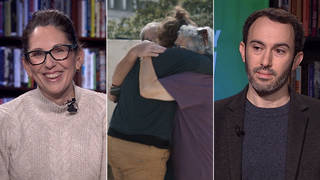
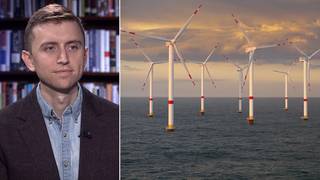

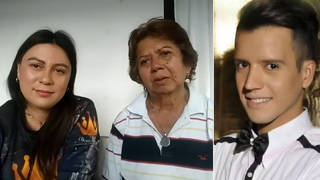

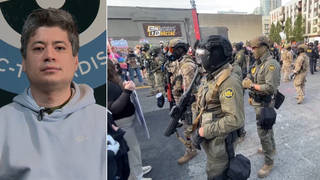
Media Options